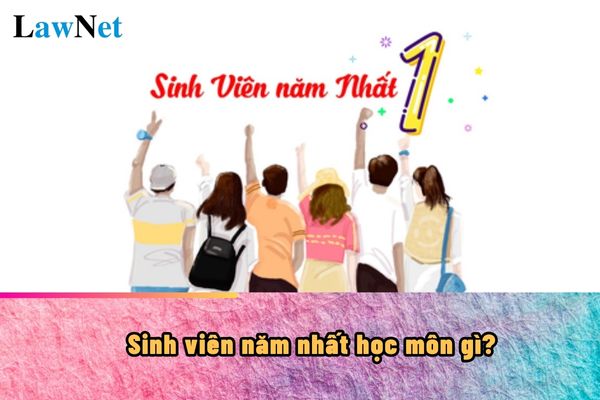What subjects do first-year students in Vietnam study? Are there any regulations on this matter?
What subjects do first-year students in Vietnam study?
Based on Section 1 of the Outline of the Scientific Socialism course curriculum at the undergraduate level issued under Decision 34/2003/QD-BGDDT:
1. Course title: Scientific Socialism.
2. Credit hours: 4 (60 periods).
3. Level: for undergraduate students.
4. Time allocation:
- Class time: 70% of total time.
- Seminar: 30% of total time.
5. Prerequisites:
Students must have completed the courses Marxist-Leninist Philosophy and Marxist-Leninist Political Economy.
...
Thus, the Scientific Socialism course is mandatory, along with the Marxist-Leninist Philosophy and Marxist-Leninist Political Economy courses which are also compulsory.
Additionally, first-year students typically study a variety of subjects depending on the major they have chosen, such as:
*Some compulsory subjects:
- Marxist-Leninist Philosophy: Helps understand the world view, methodology of Marxism-Leninism, and the theoretical basis for socialist policies.
- Ho Chi Minh's Ideology: Introduces the life, career, and ideology of President Ho Chi Minh, the great leader of the Vietnamese nation.
- Foreign Language: Often English, but other foreign languages depending on the school and major.
- Physical Education (National Defense Education): Develops health and motor skills.
- Advanced Mathematics: Extends mathematical knowledge learned in high school, providing mathematical tools for specialized subjects.
...
*Some specialized subjects by major:
- Economics students will study subjects such as Microeconomics, Macroeconomics, Statistics, Finance...
- Information Technology students will study subjects such as Programming, Data Structures, Databases, Computer Networks...
- Medical students will study subjects such as Anatomy, Physiology, Biochemistry...
In summary, the subjects that first-year students study depends on the curriculum of each major (excluding compulsory subjects).

What subjects do first-year students in Vietnam study? Are there any regulations on this matter? (Image from the Internet)
Is it permissible for first-year students in Vietnam to change their majors?
According to Clause 1, Article 16 of the undergraduate education regulations issued under Circular 08/2021/TT-BGDDT, students can be considered to change to a different program, major, or branch campus of the training institution, or from a branch campus to the main campus if they meet the following conditions:
(1) Not currently a first or last-year undergraduate student, not under consideration for expulsion, and still have sufficient study time as stipulated in Clause 5, Article 2 of the undergraduate education regulations issued under Circular 08/2021/TT-BGDDT which states:
The maximum time for students to complete the course is regulated by the training institution, not exceeding twice the standard full program duration for each training form.
For students in the bridge program who have had credits waived, the maximum time to complete the course is determined based on the standard program duration minus the waived credit load accordingly.
(2) Students meet the admission criteria of the program, major, main campus (or branch campus) in the same admission cohort;
(3) The training institution, main campus (or branch campus) has sufficient quality assurance conditions and not exceeding the training capacity for that program, major according to current regulations of the Ministry of Education and Training;
(4) With the consent of the heads of the specialized units in charge of the program, major, the person in charge of the branch campus (both transferring and receiving sides), and the principal of the training institution.
Thus, according to the regulation, first-year students are not allowed to change majors because they do not meet the conditions.
What are the regulations on credit transfer for university students in Vietnam?
According to Article 13 of Circular 19/2021/TT-BTC, the regulations on recognizing learning outcomes and credit transfer are as follows:
Recognition of Learning Outcomes and Credit Transfer
1. Learning outcomes accumulated from another education level, another major, or another training program, another course, or from another training institution may be considered for recognition and transfer to credits of the course programs being pursued.
2. The specialized council of the training institution considers recognition and credit transfer based on the comparison of output standards, content, and study load, evaluation methods of the course and quality assurance conditions at various levels:
a) Recognition, transfer by individual course;
b) Recognition, transfer by course group;
c) Recognition, transfer of the entire training program.
3. The training institution shall publicize the regulations on recognizing learning outcomes and credit transfer. The maximum credit load recognized and transferred must not exceed 50% of the minimum study load of the training program; for teacher training programs, as per the guidance of the Ministry of Education and Training.
The regulation clearly states that university students who have accumulated learning outcomes from another education level, another major, another training program, another course, or from another training institution may be considered for recognition and credit transfer to those courses in the current training program.
Thus, according to this regulation, university students can transfer credits (understood as transferring the credits they have studied) between universities.
For example, a student who has accumulated 15 credits at school A can transfer these credits to school B to continue studying.

